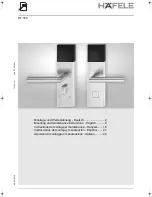
Step #3 – Press the learn button
on the Receiver Latch until the
yellow LED lights to insure that
the Latch is in the open position
Step #4 – Remove release paper
from the back of the strike plate
Learn Button
Release Paper
Step #5 – Close door firmly and open it
again. The strike plate will become
affixed to the door in the proper
mounting position. Remove and discard
red installation tool
Step #6 - Screw the strike plate in
place using 2 of the #6 x ½” screws
supplied. If attaching to material
less than ¾” thick, alternate
fasteners may be required.
Step #3 – Press the learn button
on the Receiver Latch until the
yellow LED lights to insure that
the Latch is in the open position
Step #4 – Remove release paper
from the back of the strike plate
Learn Button
Release Paper
Step #5 – Close door firmly and open it
again. The strike plate will become
affixed to the door in the proper
mounting position. Remove and discard
red installation tool
Step #6 - Screw the strike plate in
place using 2 of the #6 x ½” screws
supplied. If attaching to material
less than ¾” thick, alternate
fasteners may be required.
Installation Instructions – Transmitter Pad
The Transmitter Pad has a functional range of 15 feet from the Receiver Latch and can be
mounted virtually anywhere on any non-metallic panel. To mount, simply remove the
release paper from the tape on the back side of the Transmitter Pad, and press into place.
Suggested mounting areas
•
Cabinet door face or drawer face
•
Wall above switch plate
•
Inside unlocked cabinet door or drawer to be hidden
Remove release
paper from tape
The StealthLock keypad contains
antimicrobial protection which
inhibits the growth of bacteria,
mold and mildew
4




























